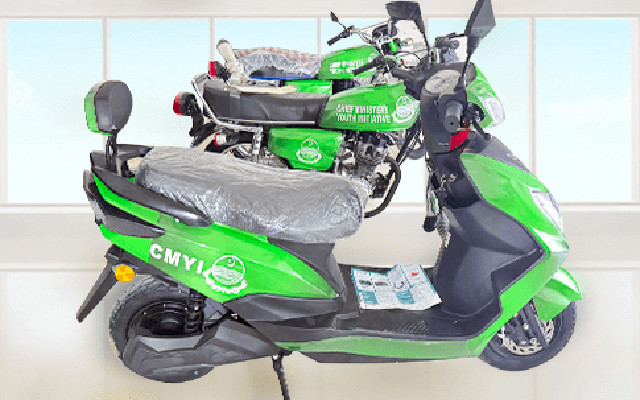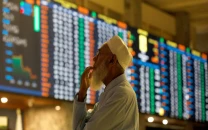E-bike revolution: a road yet to be taken
Despite being home to 22m motorcycles, Pakistan lags behind in e-bike adoption, policy development

In a world grappling with environmental crises, the electric vehicle (EV) revolution has become a global necessity. Leading the way in South Asia is India, with its prime minister's ambitious e-mobility initiative, the "National Electric Mobility Mission Plan" (NEMMP).
This policy aims to electrify the country's transportation sector, reducing dependency on fossil fuels and significantly cutting carbon emissions. India's subsidies for electric two-wheelers, tax benefits, and investments in charging infrastructure have propelled its EV sector forward, achieving impressive growth.
The result; India has become one of the largest markets for electric two-wheelers, with manufacturers like Ola Electric, Ather Energy, and Bajaj setting global benchmarks.
In stark contrast, Pakistan has yet to embrace the e-bike revolution with similar vigour. Despite being home to over 22 million conventional motorcycles – an ideal platform for electrification – the country lags behind in both adoption and policy development.
E-bikes, or electric two-wheelers, have started gaining attention in Pakistan, particularly in urban centres like Karachi, Lahore, and Islamabad. Rising fuel prices and growing environmental awareness have pushed middle-income households and delivery service operators to explore this alternative. Several local companies, such as Jolta Electric and Road King, have introduced e-bike models ranging from basic commuter bikes to slightly higher-end models designed for performance.
While the cost of a conventional 70cc motorcycle in Pakistan ranges between Rs120,000 and Rs160,000, most e-bikes are priced higher, starting from Rs170,000. Despite the initial cost, e-bikes offer significant long-term savings by eliminating fuel expenses, which currently burden Pakistani households as petrol prices remain volatile. Moreover, the low maintenance requirements of electric two-wheelers – no engine oil changes or spark plugs – make them a financially attractive option.
Lessons from India
India's proactive approach to promoting e-mobility offers valuable lessons for Pakistan. The Indian government has rolled out multiple subsidy programmes under the Faster Adoption and Manufacturing of Hybrid and Electric Vehicles (FAME) scheme, offering significant financial incentives for e-bike buyers.
Coupled with investments in infrastructure, such as the installation of over 5,000 EV charging stations, India has successfully created an ecosystem that supports EV growth.
Moreover, the Indian market is characterised by healthy competition among domestic players, leading to innovation and price reduction. For instance, Ola Electric's affordable models have made e-bikes accessible to the masses, while high-performance brands like Ather Energy cater to niche segments. Such diversity in offerings has fuelled rapid adoption.
Pakistan can replicate these strategies by introducing targeted subsidies and reducing import duties on EV components. Collaboration with China, a global EV leader, could also facilitate technology transfer and cost-effective manufacturing.
Challenges hindering e-bike adoption
Despite its potential, Pakistan faces significant hurdles in embracing e-bikes:
High initial costs: E-bikes remain financially out of reach for a majority of Pakistanis. While the higher upfront price is offset by lower operational costs, this trade-off is not immediately apparent to many potential buyers.
Lack of infrastructure: Unlike India, Pakistan has yet to invest in charging infrastructure. Most urban areas lack dedicated charging stations, making it inconvenient for e-bike owners to recharge their vehicles.
Limited policy support: Pakistan lacks a cohesive EV policy. Although the government announced an EV policy in 2020, its implementation has been slow, and incentives for two-wheelers are minimal.
Public awareness and scepticism: Many consumers are unaware of the long-term benefits of e-bikes, while others remain sceptical about their reliability and performance, particularly in hilly terrains or during power outages.
Energy crisis: Pakistan's frequent electricity shortages raise concerns about whether the grid can handle the additional load from charging EVs, creating a vicious cycle of mistrust.
The road ahead
As global trends shift rapidly towards sustainable mobility, Pakistan stands at a critical juncture. The world is witnessing a surge in the adoption of electric two-wheelers, driven by a combination of climate concerns, skyrocketing fuel costs, and technological advancements.
Countries like India are setting benchmarks with visionary policies and public-private collaborations, proving that a coordinated effort can yield transformative results.
For Pakistan, the question is no longer about the feasibility of e-bikes but about whether the country can afford to delay their adoption any further. With urban air pollution reaching alarming levels and fuel import bills straining the national economy, the time for action is now. Pakistan's large population of motorcycle users presents a vast opportunity for electrification, if harnessed correctly.
The global EV market is projected to grow exponentially over the next decade, with a significant share expected to come from Asia. If Pakistan invests in e-bike manufacturing and infrastructure today, it can position itself as a regional player in the EV supply chain. Additionally, regional collaborations, such as technology-sharing agreements with China, could reduce costs and build local expertise.
Incorporating generative AI into policy modelling and implementation could further accelerate progress. AI-driven insights can help design optimised charging networks, predict market trends, and engage consumers effectively through targeted campaigns. By leveraging such technologies, Pakistan can leapfrog traditional barriers and integrate into the modern mobility ecosystem.
The window for catching up is rapidly closing. While challenges like infrastructure, cost, and public scepticism remain, they are not insurmountable. With decisive action and a clear roadmap, Pakistan can not only meet its environmental goals but also create a sustainable, self-reliant economy powered by green energy. The e-bike revolution is knocking at Pakistan's door; it's time to answer the call.
THE WRITER IS A MECHANICAL ENGINEER AND IS PURSUING HIS MASTER'S





















COMMENTS (3)
Comments are moderated and generally will be posted if they are on-topic and not abusive.
For more information, please see our Comments FAQ